Developing Management & Leadership Skills: A Detailed Report
VerifiedAdded on 2023/06/12
|13
|3824
|491
Report
AI Summary
This report provides an overview of personal and management skills, focusing on leadership and management theories and their application in organizational settings. Task 1 reflects on management and leadership skills using models such as Scientific Management Theory, Principle of Administrative Management Theory, Situational Theory of Leadership, and Behavioral Theory of Leadership, alongside a personal development plan emphasizing SMART goals. Task 2 explains transferable skills, particularly within Bentley Motors, using Supportive Communication (Magic Bullet Theory) and Motivation (Herzberg's Two-Factor Theory) to illustrate their importance in enhancing employee performance and organizational productivity. The report concludes by highlighting the significance of these skills in achieving organizational objectives and fostering a positive work environment.
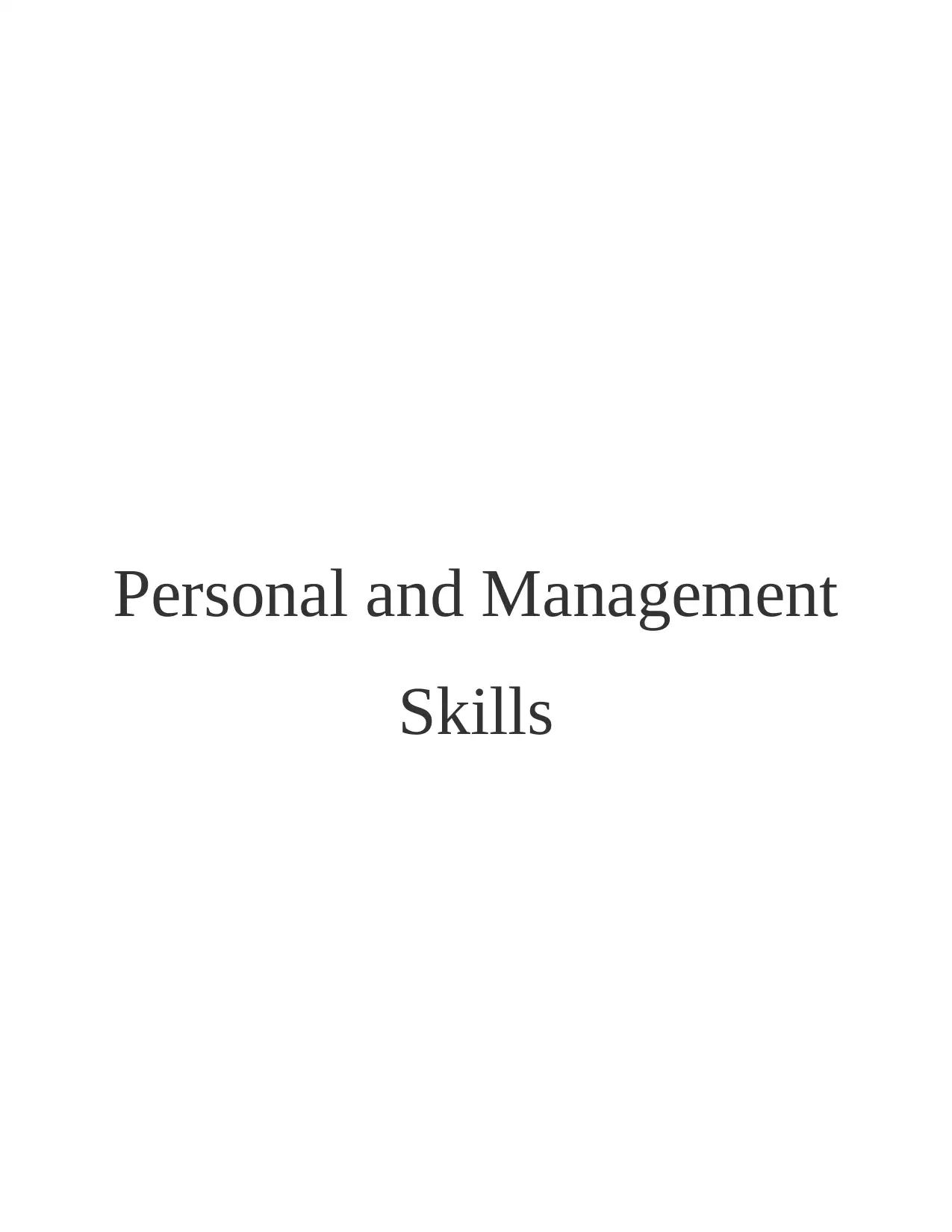
Personal and Management
Skills
Skills
Paraphrase This Document
Need a fresh take? Get an instant paraphrase of this document with our AI Paraphraser
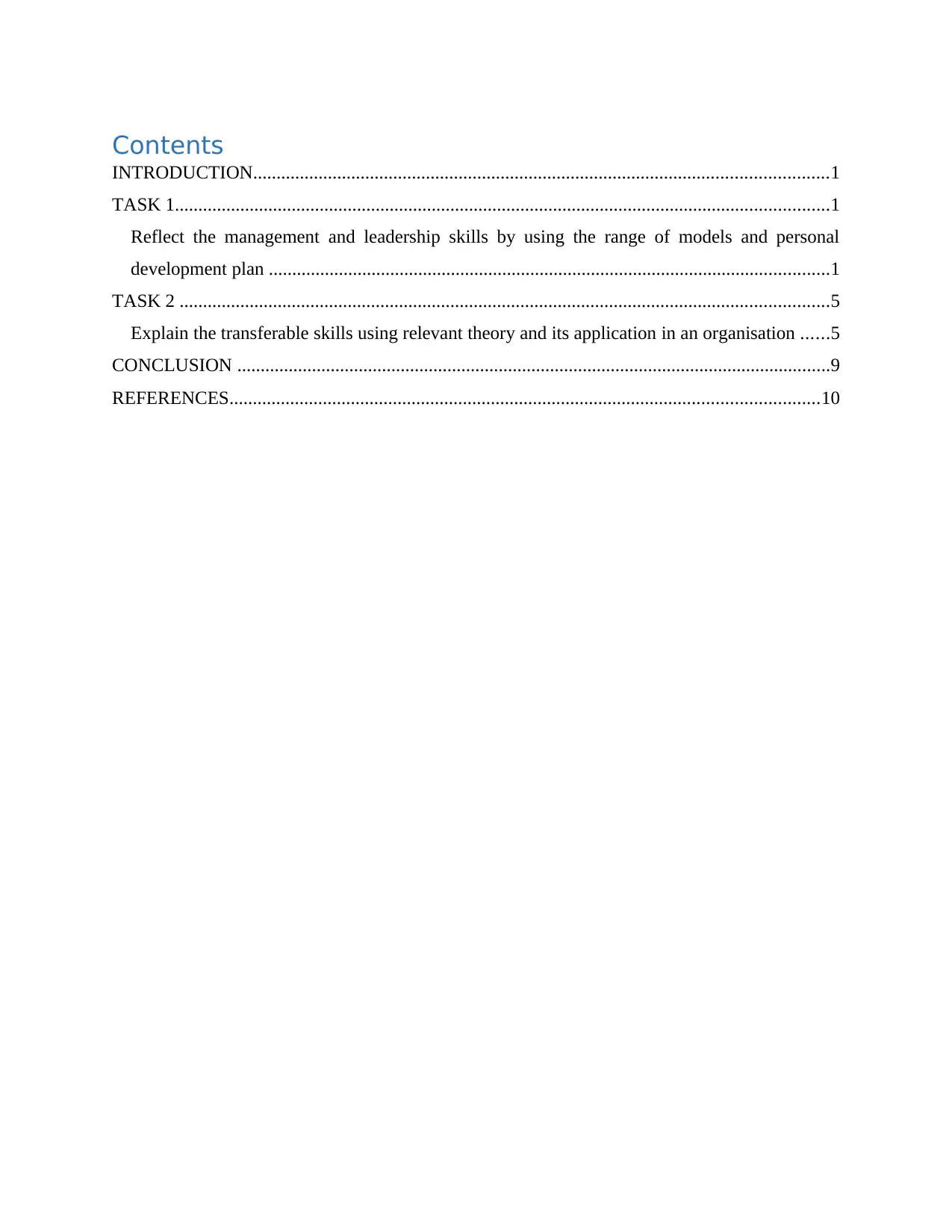
Contents
INTRODUCTION...........................................................................................................................1
TASK 1............................................................................................................................................1
Reflect the management and leadership skills by using the range of models and personal
development plan ........................................................................................................................1
TASK 2 ...........................................................................................................................................5
Explain the transferable skills using relevant theory and its application in an organisation ......5
CONCLUSION ...............................................................................................................................9
REFERENCES..............................................................................................................................10
INTRODUCTION...........................................................................................................................1
TASK 1............................................................................................................................................1
Reflect the management and leadership skills by using the range of models and personal
development plan ........................................................................................................................1
TASK 2 ...........................................................................................................................................5
Explain the transferable skills using relevant theory and its application in an organisation ......5
CONCLUSION ...............................................................................................................................9
REFERENCES..............................................................................................................................10
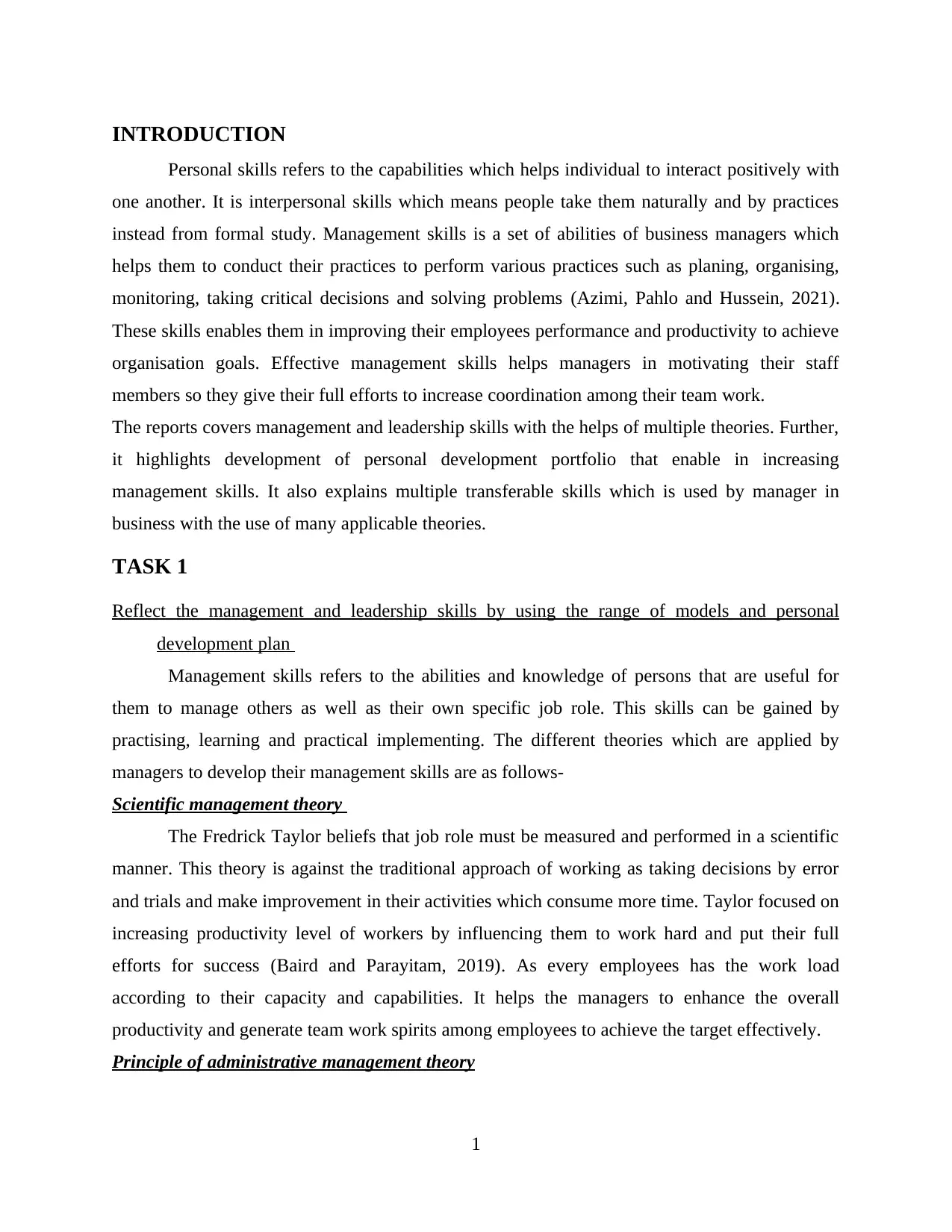
INTRODUCTION
Personal skills refers to the capabilities which helps individual to interact positively with
one another. It is interpersonal skills which means people take them naturally and by practices
instead from formal study. Management skills is a set of abilities of business managers which
helps them to conduct their practices to perform various practices such as planing, organising,
monitoring, taking critical decisions and solving problems (Azimi, Pahlo and Hussein, 2021).
These skills enables them in improving their employees performance and productivity to achieve
organisation goals. Effective management skills helps managers in motivating their staff
members so they give their full efforts to increase coordination among their team work.
The reports covers management and leadership skills with the helps of multiple theories. Further,
it highlights development of personal development portfolio that enable in increasing
management skills. It also explains multiple transferable skills which is used by manager in
business with the use of many applicable theories.
TASK 1
Reflect the management and leadership skills by using the range of models and personal
development plan
Management skills refers to the abilities and knowledge of persons that are useful for
them to manage others as well as their own specific job role. This skills can be gained by
practising, learning and practical implementing. The different theories which are applied by
managers to develop their management skills are as follows-
Scientific management theory
The Fredrick Taylor beliefs that job role must be measured and performed in a scientific
manner. This theory is against the traditional approach of working as taking decisions by error
and trials and make improvement in their activities which consume more time. Taylor focused on
increasing productivity level of workers by influencing them to work hard and put their full
efforts for success (Baird and Parayitam, 2019). As every employees has the work load
according to their capacity and capabilities. It helps the managers to enhance the overall
productivity and generate team work spirits among employees to achieve the target effectively.
Principle of administrative management theory
1
Personal skills refers to the capabilities which helps individual to interact positively with
one another. It is interpersonal skills which means people take them naturally and by practices
instead from formal study. Management skills is a set of abilities of business managers which
helps them to conduct their practices to perform various practices such as planing, organising,
monitoring, taking critical decisions and solving problems (Azimi, Pahlo and Hussein, 2021).
These skills enables them in improving their employees performance and productivity to achieve
organisation goals. Effective management skills helps managers in motivating their staff
members so they give their full efforts to increase coordination among their team work.
The reports covers management and leadership skills with the helps of multiple theories. Further,
it highlights development of personal development portfolio that enable in increasing
management skills. It also explains multiple transferable skills which is used by manager in
business with the use of many applicable theories.
TASK 1
Reflect the management and leadership skills by using the range of models and personal
development plan
Management skills refers to the abilities and knowledge of persons that are useful for
them to manage others as well as their own specific job role. This skills can be gained by
practising, learning and practical implementing. The different theories which are applied by
managers to develop their management skills are as follows-
Scientific management theory
The Fredrick Taylor beliefs that job role must be measured and performed in a scientific
manner. This theory is against the traditional approach of working as taking decisions by error
and trials and make improvement in their activities which consume more time. Taylor focused on
increasing productivity level of workers by influencing them to work hard and put their full
efforts for success (Baird and Parayitam, 2019). As every employees has the work load
according to their capacity and capabilities. It helps the managers to enhance the overall
productivity and generate team work spirits among employees to achieve the target effectively.
Principle of administrative management theory
1
⊘ This is a preview!⊘
Do you want full access?
Subscribe today to unlock all pages.

Trusted by 1+ million students worldwide
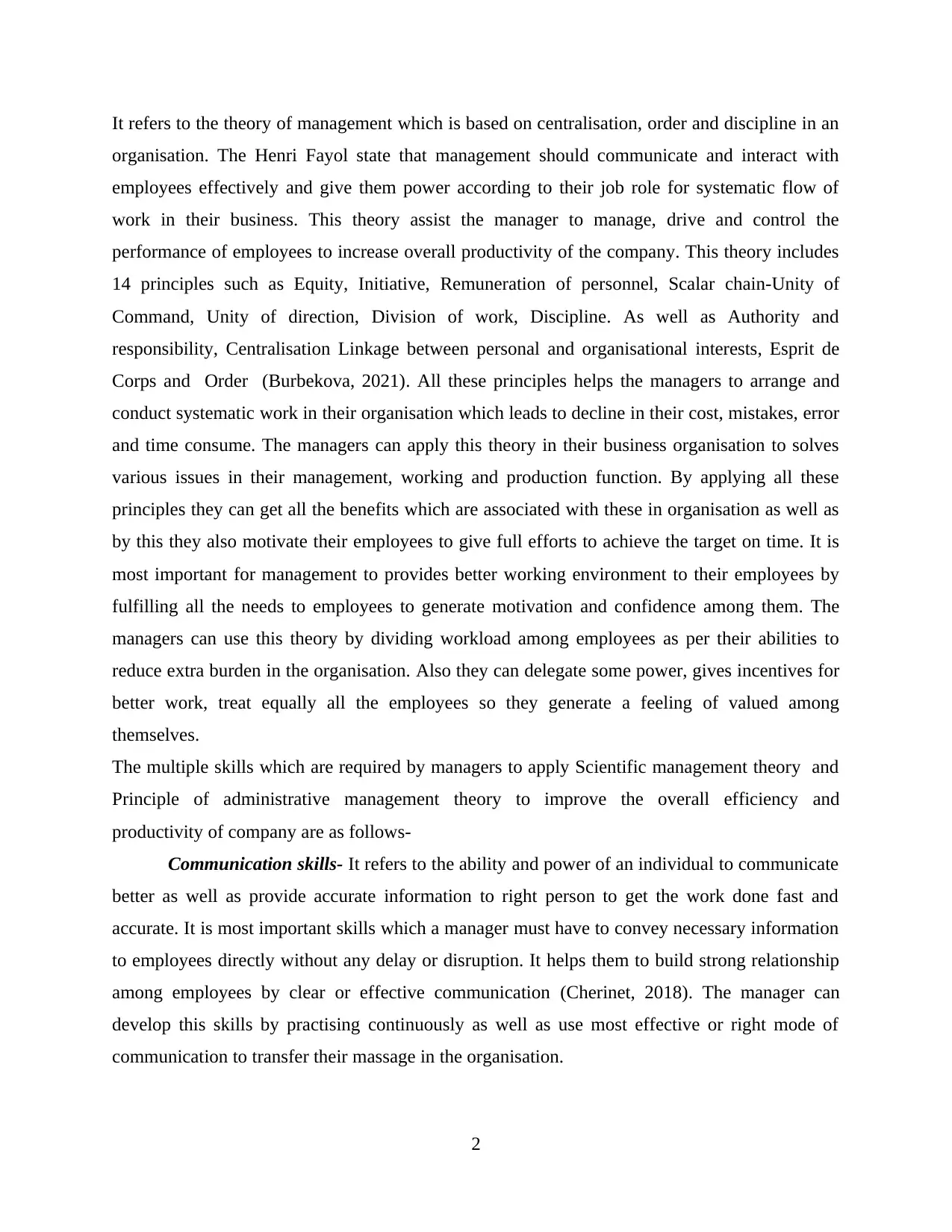
It refers to the theory of management which is based on centralisation, order and discipline in an
organisation. The Henri Fayol state that management should communicate and interact with
employees effectively and give them power according to their job role for systematic flow of
work in their business. This theory assist the manager to manage, drive and control the
performance of employees to increase overall productivity of the company. This theory includes
14 principles such as Equity, Initiative, Remuneration of personnel, Scalar chain-Unity of
Command, Unity of direction, Division of work, Discipline. As well as Authority and
responsibility, Centralisation Linkage between personal and organisational interests, Esprit de
Corps and Order (Burbekova, 2021). All these principles helps the managers to arrange and
conduct systematic work in their organisation which leads to decline in their cost, mistakes, error
and time consume. The managers can apply this theory in their business organisation to solves
various issues in their management, working and production function. By applying all these
principles they can get all the benefits which are associated with these in organisation as well as
by this they also motivate their employees to give full efforts to achieve the target on time. It is
most important for management to provides better working environment to their employees by
fulfilling all the needs to employees to generate motivation and confidence among them. The
managers can use this theory by dividing workload among employees as per their abilities to
reduce extra burden in the organisation. Also they can delegate some power, gives incentives for
better work, treat equally all the employees so they generate a feeling of valued among
themselves.
The multiple skills which are required by managers to apply Scientific management theory and
Principle of administrative management theory to improve the overall efficiency and
productivity of company are as follows-
Communication skills- It refers to the ability and power of an individual to communicate
better as well as provide accurate information to right person to get the work done fast and
accurate. It is most important skills which a manager must have to convey necessary information
to employees directly without any delay or disruption. It helps them to build strong relationship
among employees by clear or effective communication (Cherinet, 2018). The manager can
develop this skills by practising continuously as well as use most effective or right mode of
communication to transfer their massage in the organisation.
2
organisation. The Henri Fayol state that management should communicate and interact with
employees effectively and give them power according to their job role for systematic flow of
work in their business. This theory assist the manager to manage, drive and control the
performance of employees to increase overall productivity of the company. This theory includes
14 principles such as Equity, Initiative, Remuneration of personnel, Scalar chain-Unity of
Command, Unity of direction, Division of work, Discipline. As well as Authority and
responsibility, Centralisation Linkage between personal and organisational interests, Esprit de
Corps and Order (Burbekova, 2021). All these principles helps the managers to arrange and
conduct systematic work in their organisation which leads to decline in their cost, mistakes, error
and time consume. The managers can apply this theory in their business organisation to solves
various issues in their management, working and production function. By applying all these
principles they can get all the benefits which are associated with these in organisation as well as
by this they also motivate their employees to give full efforts to achieve the target on time. It is
most important for management to provides better working environment to their employees by
fulfilling all the needs to employees to generate motivation and confidence among them. The
managers can use this theory by dividing workload among employees as per their abilities to
reduce extra burden in the organisation. Also they can delegate some power, gives incentives for
better work, treat equally all the employees so they generate a feeling of valued among
themselves.
The multiple skills which are required by managers to apply Scientific management theory and
Principle of administrative management theory to improve the overall efficiency and
productivity of company are as follows-
Communication skills- It refers to the ability and power of an individual to communicate
better as well as provide accurate information to right person to get the work done fast and
accurate. It is most important skills which a manager must have to convey necessary information
to employees directly without any delay or disruption. It helps them to build strong relationship
among employees by clear or effective communication (Cherinet, 2018). The manager can
develop this skills by practising continuously as well as use most effective or right mode of
communication to transfer their massage in the organisation.
2
Paraphrase This Document
Need a fresh take? Get an instant paraphrase of this document with our AI Paraphraser
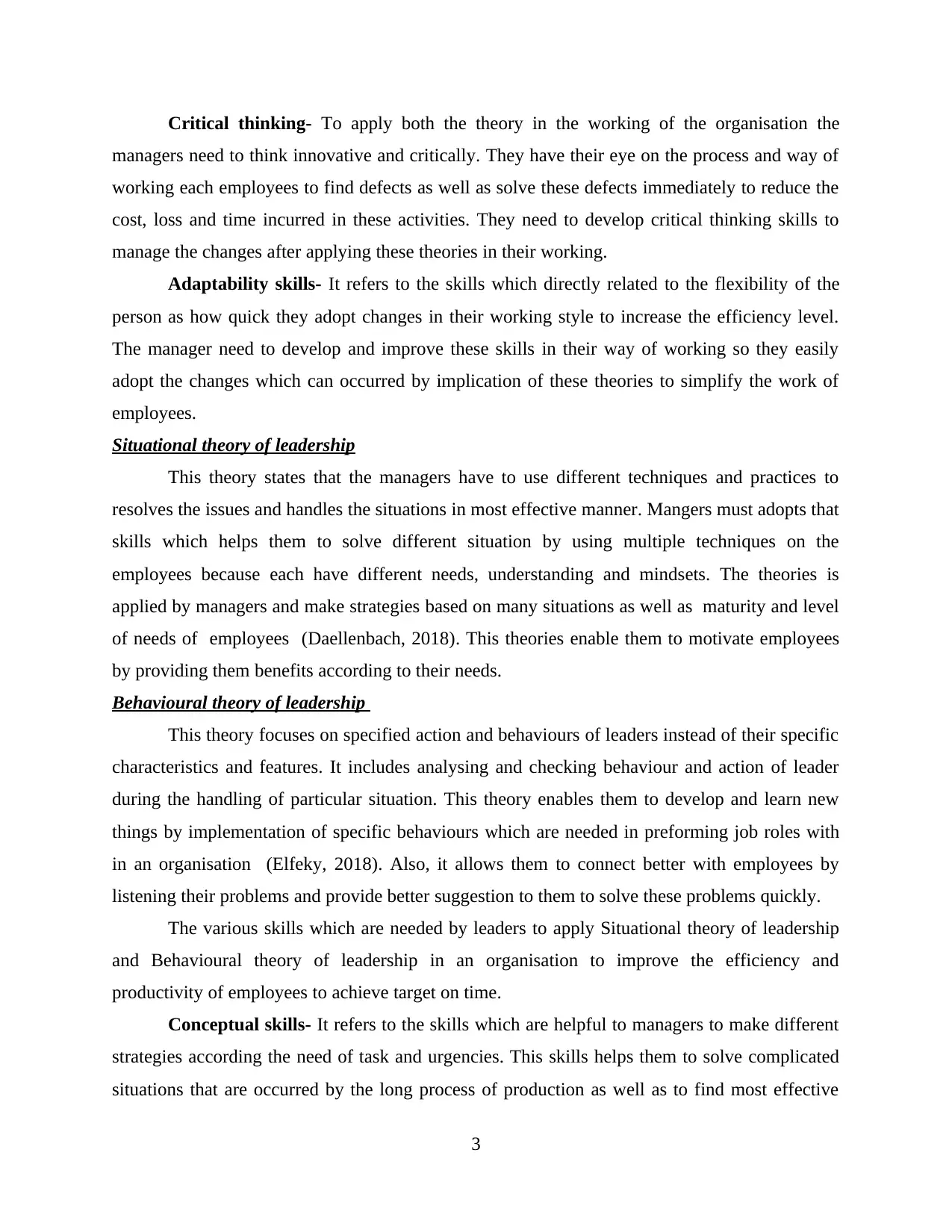
Critical thinking- To apply both the theory in the working of the organisation the
managers need to think innovative and critically. They have their eye on the process and way of
working each employees to find defects as well as solve these defects immediately to reduce the
cost, loss and time incurred in these activities. They need to develop critical thinking skills to
manage the changes after applying these theories in their working.
Adaptability skills- It refers to the skills which directly related to the flexibility of the
person as how quick they adopt changes in their working style to increase the efficiency level.
The manager need to develop and improve these skills in their way of working so they easily
adopt the changes which can occurred by implication of these theories to simplify the work of
employees.
Situational theory of leadership
This theory states that the managers have to use different techniques and practices to
resolves the issues and handles the situations in most effective manner. Mangers must adopts that
skills which helps them to solve different situation by using multiple techniques on the
employees because each have different needs, understanding and mindsets. The theories is
applied by managers and make strategies based on many situations as well as maturity and level
of needs of employees (Daellenbach, 2018). This theories enable them to motivate employees
by providing them benefits according to their needs.
Behavioural theory of leadership
This theory focuses on specified action and behaviours of leaders instead of their specific
characteristics and features. It includes analysing and checking behaviour and action of leader
during the handling of particular situation. This theory enables them to develop and learn new
things by implementation of specific behaviours which are needed in preforming job roles with
in an organisation (Elfeky, 2018). Also, it allows them to connect better with employees by
listening their problems and provide better suggestion to them to solve these problems quickly.
The various skills which are needed by leaders to apply Situational theory of leadership
and Behavioural theory of leadership in an organisation to improve the efficiency and
productivity of employees to achieve target on time.
Conceptual skills- It refers to the skills which are helpful to managers to make different
strategies according the need of task and urgencies. This skills helps them to solve complicated
situations that are occurred by the long process of production as well as to find most effective
3
managers need to think innovative and critically. They have their eye on the process and way of
working each employees to find defects as well as solve these defects immediately to reduce the
cost, loss and time incurred in these activities. They need to develop critical thinking skills to
manage the changes after applying these theories in their working.
Adaptability skills- It refers to the skills which directly related to the flexibility of the
person as how quick they adopt changes in their working style to increase the efficiency level.
The manager need to develop and improve these skills in their way of working so they easily
adopt the changes which can occurred by implication of these theories to simplify the work of
employees.
Situational theory of leadership
This theory states that the managers have to use different techniques and practices to
resolves the issues and handles the situations in most effective manner. Mangers must adopts that
skills which helps them to solve different situation by using multiple techniques on the
employees because each have different needs, understanding and mindsets. The theories is
applied by managers and make strategies based on many situations as well as maturity and level
of needs of employees (Daellenbach, 2018). This theories enable them to motivate employees
by providing them benefits according to their needs.
Behavioural theory of leadership
This theory focuses on specified action and behaviours of leaders instead of their specific
characteristics and features. It includes analysing and checking behaviour and action of leader
during the handling of particular situation. This theory enables them to develop and learn new
things by implementation of specific behaviours which are needed in preforming job roles with
in an organisation (Elfeky, 2018). Also, it allows them to connect better with employees by
listening their problems and provide better suggestion to them to solve these problems quickly.
The various skills which are needed by leaders to apply Situational theory of leadership
and Behavioural theory of leadership in an organisation to improve the efficiency and
productivity of employees to achieve target on time.
Conceptual skills- It refers to the skills which are helpful to managers to make different
strategies according the need of task and urgencies. This skills helps them to solve complicated
situations that are occurred by the long process of production as well as to find most effective
3
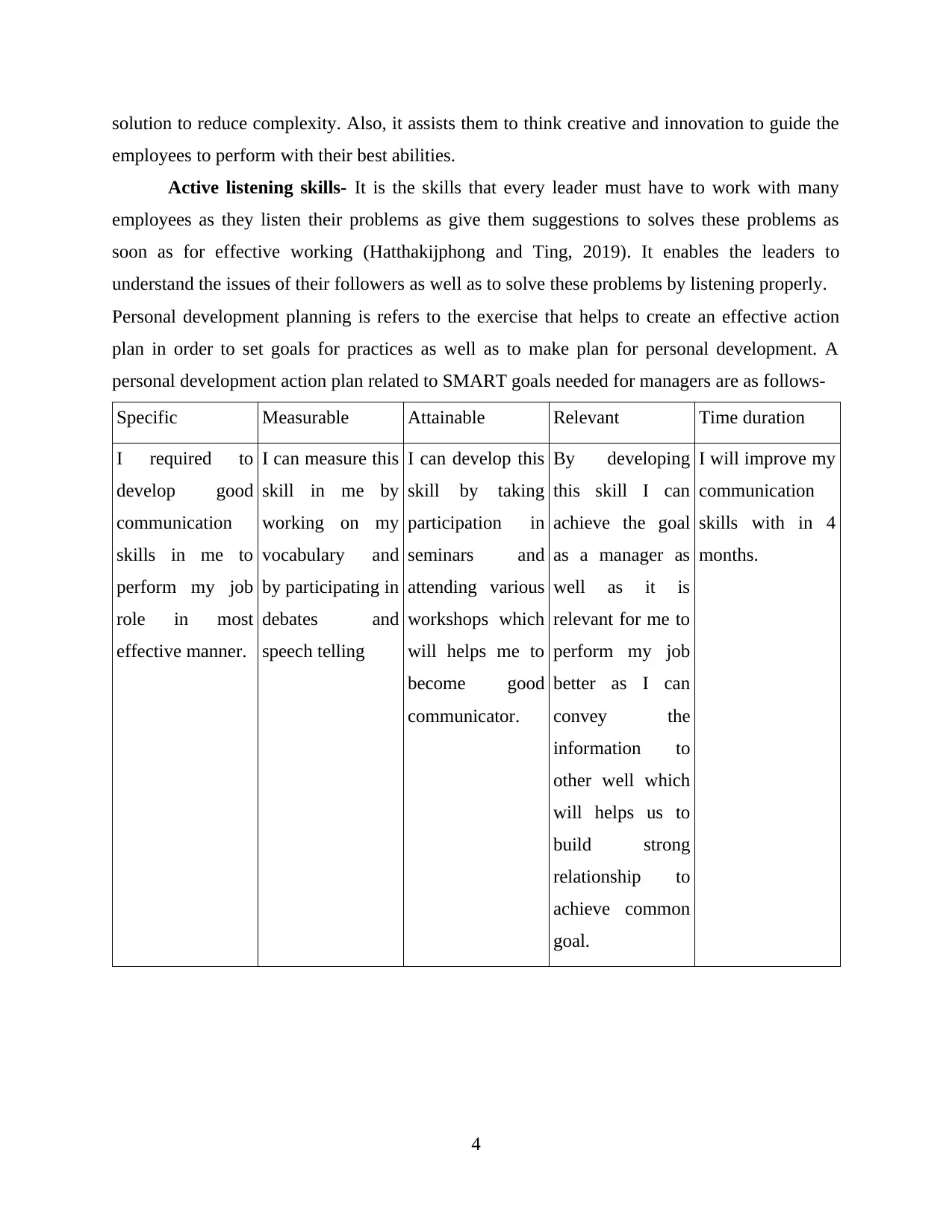
solution to reduce complexity. Also, it assists them to think creative and innovation to guide the
employees to perform with their best abilities.
Active listening skills- It is the skills that every leader must have to work with many
employees as they listen their problems as give them suggestions to solves these problems as
soon as for effective working (Hatthakijphong and Ting, 2019). It enables the leaders to
understand the issues of their followers as well as to solve these problems by listening properly.
Personal development planning is refers to the exercise that helps to create an effective action
plan in order to set goals for practices as well as to make plan for personal development. A
personal development action plan related to SMART goals needed for managers are as follows-
Specific Measurable Attainable Relevant Time duration
I required to
develop good
communication
skills in me to
perform my job
role in most
effective manner.
I can measure this
skill in me by
working on my
vocabulary and
by participating in
debates and
speech telling
I can develop this
skill by taking
participation in
seminars and
attending various
workshops which
will helps me to
become good
communicator.
By developing
this skill I can
achieve the goal
as a manager as
well as it is
relevant for me to
perform my job
better as I can
convey the
information to
other well which
will helps us to
build strong
relationship to
achieve common
goal.
I will improve my
communication
skills with in 4
months.
4
employees to perform with their best abilities.
Active listening skills- It is the skills that every leader must have to work with many
employees as they listen their problems as give them suggestions to solves these problems as
soon as for effective working (Hatthakijphong and Ting, 2019). It enables the leaders to
understand the issues of their followers as well as to solve these problems by listening properly.
Personal development planning is refers to the exercise that helps to create an effective action
plan in order to set goals for practices as well as to make plan for personal development. A
personal development action plan related to SMART goals needed for managers are as follows-
Specific Measurable Attainable Relevant Time duration
I required to
develop good
communication
skills in me to
perform my job
role in most
effective manner.
I can measure this
skill in me by
working on my
vocabulary and
by participating in
debates and
speech telling
I can develop this
skill by taking
participation in
seminars and
attending various
workshops which
will helps me to
become good
communicator.
By developing
this skill I can
achieve the goal
as a manager as
well as it is
relevant for me to
perform my job
better as I can
convey the
information to
other well which
will helps us to
build strong
relationship to
achieve common
goal.
I will improve my
communication
skills with in 4
months.
4
⊘ This is a preview!⊘
Do you want full access?
Subscribe today to unlock all pages.

Trusted by 1+ million students worldwide
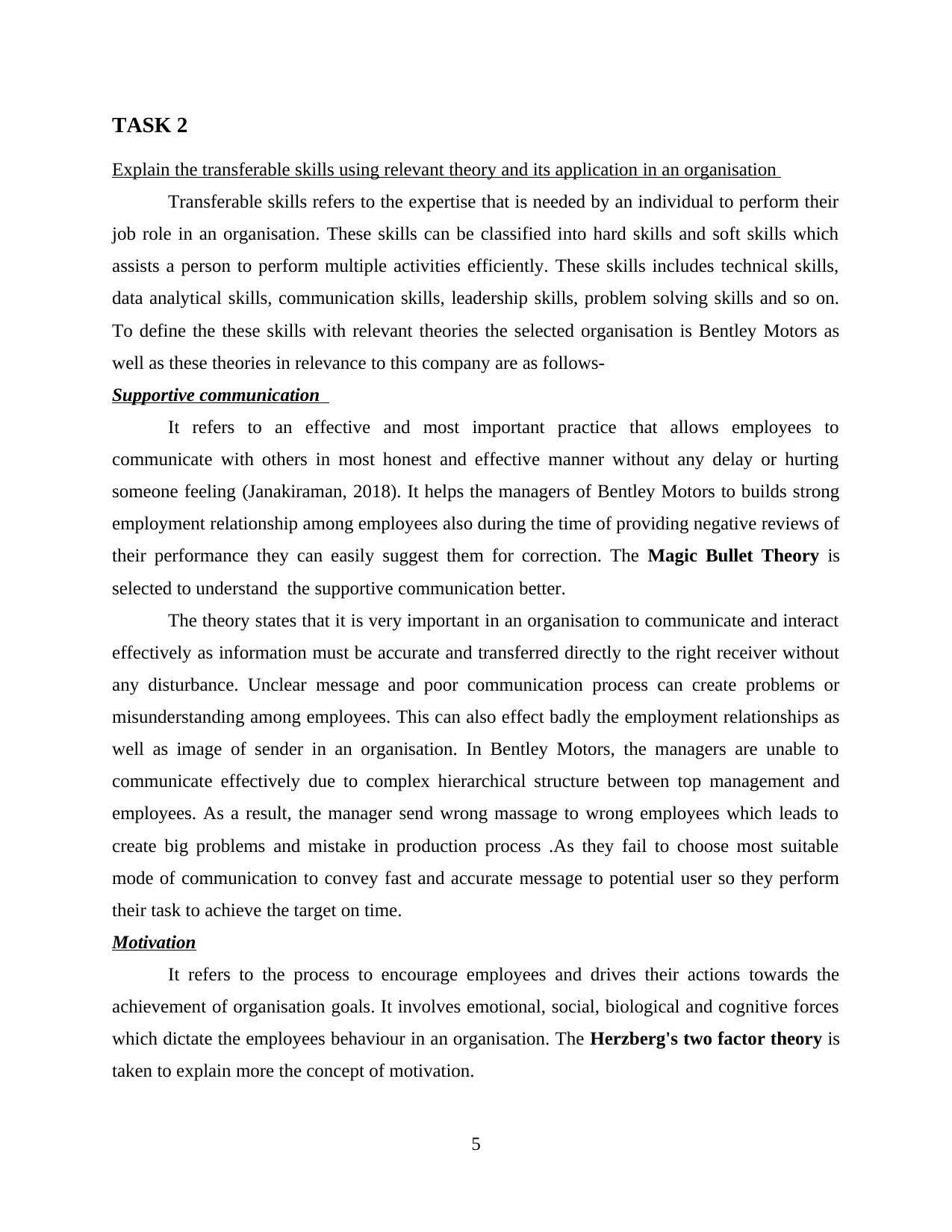
TASK 2
Explain the transferable skills using relevant theory and its application in an organisation
Transferable skills refers to the expertise that is needed by an individual to perform their
job role in an organisation. These skills can be classified into hard skills and soft skills which
assists a person to perform multiple activities efficiently. These skills includes technical skills,
data analytical skills, communication skills, leadership skills, problem solving skills and so on.
To define the these skills with relevant theories the selected organisation is Bentley Motors as
well as these theories in relevance to this company are as follows-
Supportive communication
It refers to an effective and most important practice that allows employees to
communicate with others in most honest and effective manner without any delay or hurting
someone feeling (Janakiraman, 2018). It helps the managers of Bentley Motors to builds strong
employment relationship among employees also during the time of providing negative reviews of
their performance they can easily suggest them for correction. The Magic Bullet Theory is
selected to understand the supportive communication better.
The theory states that it is very important in an organisation to communicate and interact
effectively as information must be accurate and transferred directly to the right receiver without
any disturbance. Unclear message and poor communication process can create problems or
misunderstanding among employees. This can also effect badly the employment relationships as
well as image of sender in an organisation. In Bentley Motors, the managers are unable to
communicate effectively due to complex hierarchical structure between top management and
employees. As a result, the manager send wrong massage to wrong employees which leads to
create big problems and mistake in production process .As they fail to choose most suitable
mode of communication to convey fast and accurate message to potential user so they perform
their task to achieve the target on time.
Motivation
It refers to the process to encourage employees and drives their actions towards the
achievement of organisation goals. It involves emotional, social, biological and cognitive forces
which dictate the employees behaviour in an organisation. The Herzberg's two factor theory is
taken to explain more the concept of motivation.
5
Explain the transferable skills using relevant theory and its application in an organisation
Transferable skills refers to the expertise that is needed by an individual to perform their
job role in an organisation. These skills can be classified into hard skills and soft skills which
assists a person to perform multiple activities efficiently. These skills includes technical skills,
data analytical skills, communication skills, leadership skills, problem solving skills and so on.
To define the these skills with relevant theories the selected organisation is Bentley Motors as
well as these theories in relevance to this company are as follows-
Supportive communication
It refers to an effective and most important practice that allows employees to
communicate with others in most honest and effective manner without any delay or hurting
someone feeling (Janakiraman, 2018). It helps the managers of Bentley Motors to builds strong
employment relationship among employees also during the time of providing negative reviews of
their performance they can easily suggest them for correction. The Magic Bullet Theory is
selected to understand the supportive communication better.
The theory states that it is very important in an organisation to communicate and interact
effectively as information must be accurate and transferred directly to the right receiver without
any disturbance. Unclear message and poor communication process can create problems or
misunderstanding among employees. This can also effect badly the employment relationships as
well as image of sender in an organisation. In Bentley Motors, the managers are unable to
communicate effectively due to complex hierarchical structure between top management and
employees. As a result, the manager send wrong massage to wrong employees which leads to
create big problems and mistake in production process .As they fail to choose most suitable
mode of communication to convey fast and accurate message to potential user so they perform
their task to achieve the target on time.
Motivation
It refers to the process to encourage employees and drives their actions towards the
achievement of organisation goals. It involves emotional, social, biological and cognitive forces
which dictate the employees behaviour in an organisation. The Herzberg's two factor theory is
taken to explain more the concept of motivation.
5
Paraphrase This Document
Need a fresh take? Get an instant paraphrase of this document with our AI Paraphraser
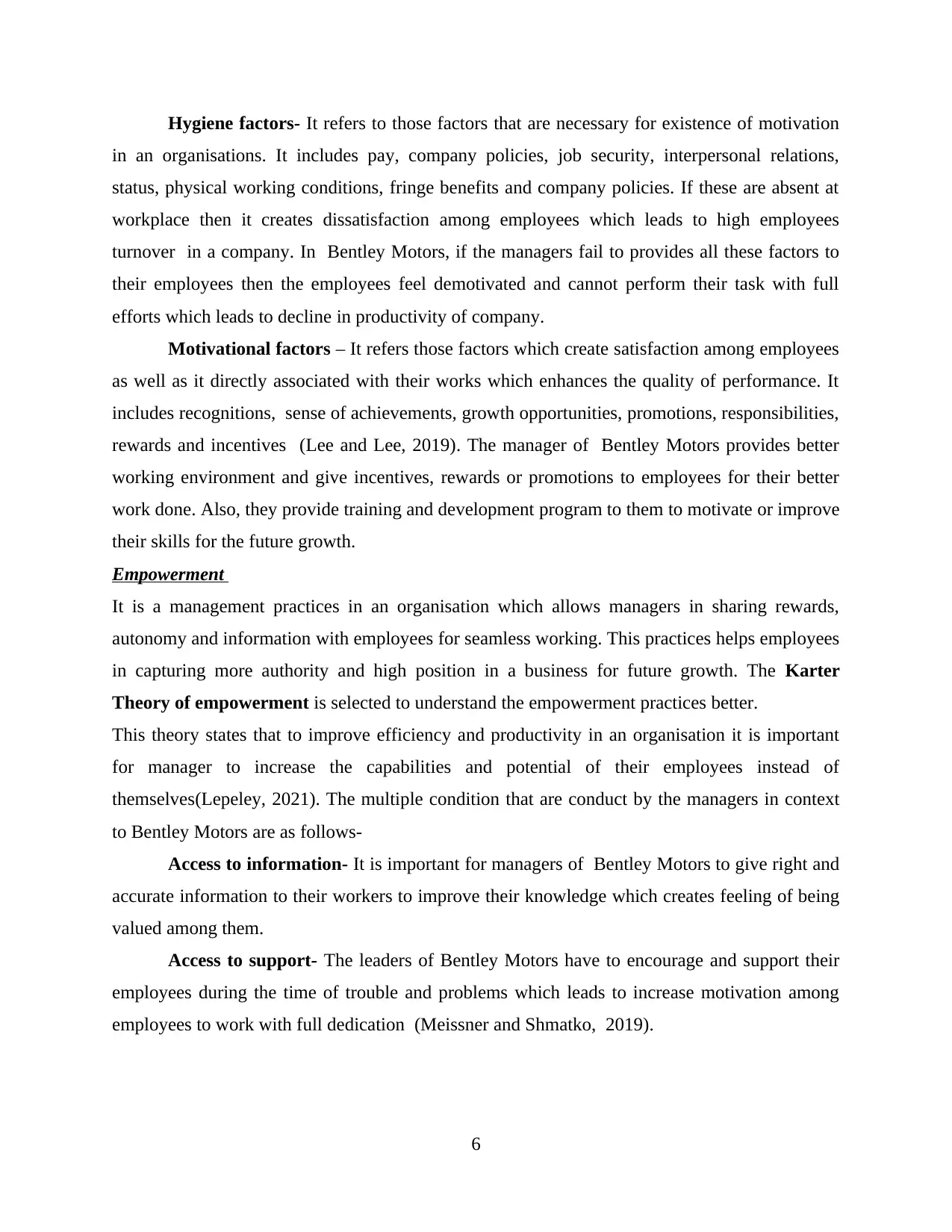
Hygiene factors- It refers to those factors that are necessary for existence of motivation
in an organisations. It includes pay, company policies, job security, interpersonal relations,
status, physical working conditions, fringe benefits and company policies. If these are absent at
workplace then it creates dissatisfaction among employees which leads to high employees
turnover in a company. In Bentley Motors, if the managers fail to provides all these factors to
their employees then the employees feel demotivated and cannot perform their task with full
efforts which leads to decline in productivity of company.
Motivational factors – It refers those factors which create satisfaction among employees
as well as it directly associated with their works which enhances the quality of performance. It
includes recognitions, sense of achievements, growth opportunities, promotions, responsibilities,
rewards and incentives (Lee and Lee, 2019). The manager of Bentley Motors provides better
working environment and give incentives, rewards or promotions to employees for their better
work done. Also, they provide training and development program to them to motivate or improve
their skills for the future growth.
Empowerment
It is a management practices in an organisation which allows managers in sharing rewards,
autonomy and information with employees for seamless working. This practices helps employees
in capturing more authority and high position in a business for future growth. The Karter
Theory of empowerment is selected to understand the empowerment practices better.
This theory states that to improve efficiency and productivity in an organisation it is important
for manager to increase the capabilities and potential of their employees instead of
themselves(Lepeley, 2021). The multiple condition that are conduct by the managers in context
to Bentley Motors are as follows-
Access to information- It is important for managers of Bentley Motors to give right and
accurate information to their workers to improve their knowledge which creates feeling of being
valued among them.
Access to support- The leaders of Bentley Motors have to encourage and support their
employees during the time of trouble and problems which leads to increase motivation among
employees to work with full dedication (Meissner and Shmatko, 2019).
6
in an organisations. It includes pay, company policies, job security, interpersonal relations,
status, physical working conditions, fringe benefits and company policies. If these are absent at
workplace then it creates dissatisfaction among employees which leads to high employees
turnover in a company. In Bentley Motors, if the managers fail to provides all these factors to
their employees then the employees feel demotivated and cannot perform their task with full
efforts which leads to decline in productivity of company.
Motivational factors – It refers those factors which create satisfaction among employees
as well as it directly associated with their works which enhances the quality of performance. It
includes recognitions, sense of achievements, growth opportunities, promotions, responsibilities,
rewards and incentives (Lee and Lee, 2019). The manager of Bentley Motors provides better
working environment and give incentives, rewards or promotions to employees for their better
work done. Also, they provide training and development program to them to motivate or improve
their skills for the future growth.
Empowerment
It is a management practices in an organisation which allows managers in sharing rewards,
autonomy and information with employees for seamless working. This practices helps employees
in capturing more authority and high position in a business for future growth. The Karter
Theory of empowerment is selected to understand the empowerment practices better.
This theory states that to improve efficiency and productivity in an organisation it is important
for manager to increase the capabilities and potential of their employees instead of
themselves(Lepeley, 2021). The multiple condition that are conduct by the managers in context
to Bentley Motors are as follows-
Access to information- It is important for managers of Bentley Motors to give right and
accurate information to their workers to improve their knowledge which creates feeling of being
valued among them.
Access to support- The leaders of Bentley Motors have to encourage and support their
employees during the time of trouble and problems which leads to increase motivation among
employees to work with full dedication (Meissner and Shmatko, 2019).
6
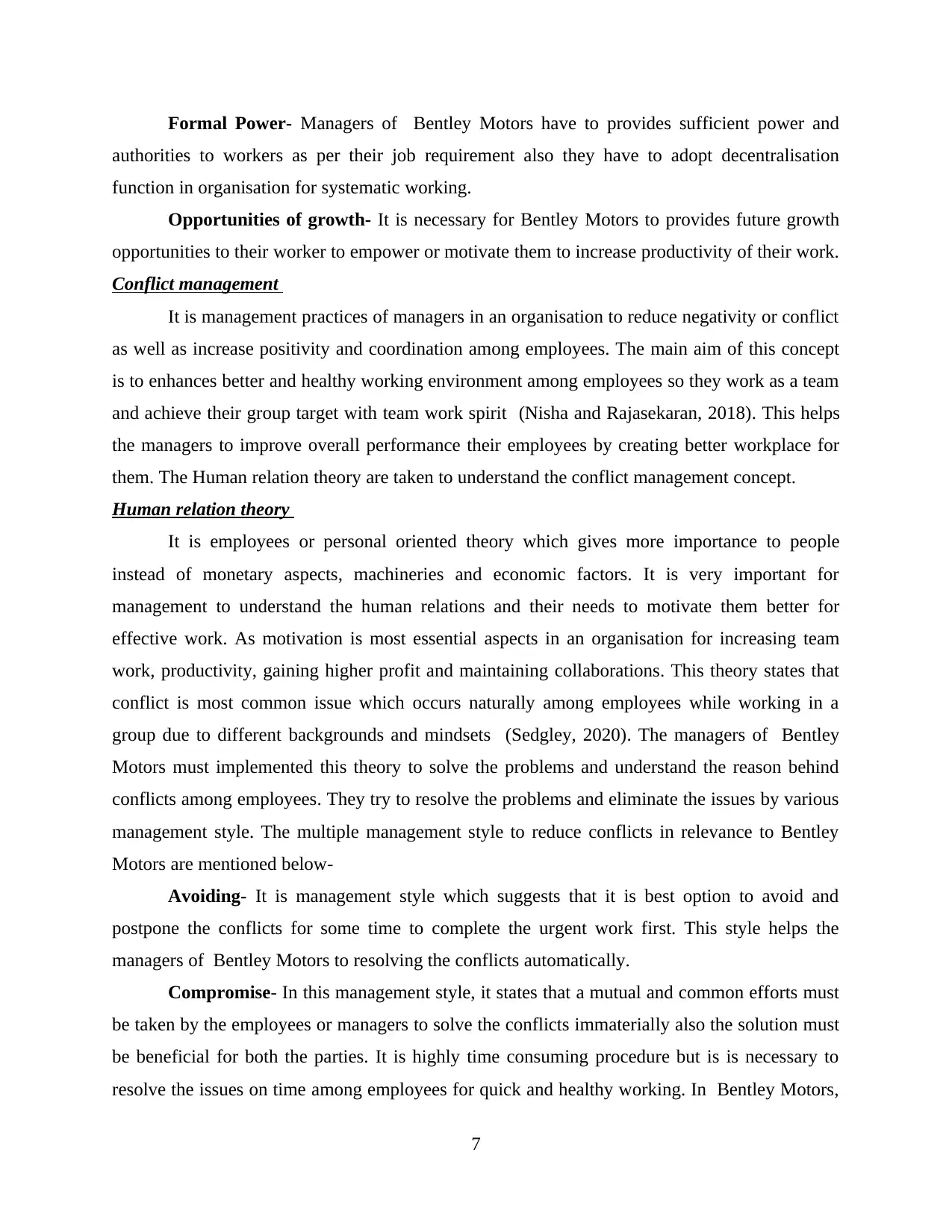
Formal Power- Managers of Bentley Motors have to provides sufficient power and
authorities to workers as per their job requirement also they have to adopt decentralisation
function in organisation for systematic working.
Opportunities of growth- It is necessary for Bentley Motors to provides future growth
opportunities to their worker to empower or motivate them to increase productivity of their work.
Conflict management
It is management practices of managers in an organisation to reduce negativity or conflict
as well as increase positivity and coordination among employees. The main aim of this concept
is to enhances better and healthy working environment among employees so they work as a team
and achieve their group target with team work spirit (Nisha and Rajasekaran, 2018). This helps
the managers to improve overall performance their employees by creating better workplace for
them. The Human relation theory are taken to understand the conflict management concept.
Human relation theory
It is employees or personal oriented theory which gives more importance to people
instead of monetary aspects, machineries and economic factors. It is very important for
management to understand the human relations and their needs to motivate them better for
effective work. As motivation is most essential aspects in an organisation for increasing team
work, productivity, gaining higher profit and maintaining collaborations. This theory states that
conflict is most common issue which occurs naturally among employees while working in a
group due to different backgrounds and mindsets (Sedgley, 2020). The managers of Bentley
Motors must implemented this theory to solve the problems and understand the reason behind
conflicts among employees. They try to resolve the problems and eliminate the issues by various
management style. The multiple management style to reduce conflicts in relevance to Bentley
Motors are mentioned below-
Avoiding- It is management style which suggests that it is best option to avoid and
postpone the conflicts for some time to complete the urgent work first. This style helps the
managers of Bentley Motors to resolving the conflicts automatically.
Compromise- In this management style, it states that a mutual and common efforts must
be taken by the employees or managers to solve the conflicts immaterially also the solution must
be beneficial for both the parties. It is highly time consuming procedure but is is necessary to
resolve the issues on time among employees for quick and healthy working. In Bentley Motors,
7
authorities to workers as per their job requirement also they have to adopt decentralisation
function in organisation for systematic working.
Opportunities of growth- It is necessary for Bentley Motors to provides future growth
opportunities to their worker to empower or motivate them to increase productivity of their work.
Conflict management
It is management practices of managers in an organisation to reduce negativity or conflict
as well as increase positivity and coordination among employees. The main aim of this concept
is to enhances better and healthy working environment among employees so they work as a team
and achieve their group target with team work spirit (Nisha and Rajasekaran, 2018). This helps
the managers to improve overall performance their employees by creating better workplace for
them. The Human relation theory are taken to understand the conflict management concept.
Human relation theory
It is employees or personal oriented theory which gives more importance to people
instead of monetary aspects, machineries and economic factors. It is very important for
management to understand the human relations and their needs to motivate them better for
effective work. As motivation is most essential aspects in an organisation for increasing team
work, productivity, gaining higher profit and maintaining collaborations. This theory states that
conflict is most common issue which occurs naturally among employees while working in a
group due to different backgrounds and mindsets (Sedgley, 2020). The managers of Bentley
Motors must implemented this theory to solve the problems and understand the reason behind
conflicts among employees. They try to resolve the problems and eliminate the issues by various
management style. The multiple management style to reduce conflicts in relevance to Bentley
Motors are mentioned below-
Avoiding- It is management style which suggests that it is best option to avoid and
postpone the conflicts for some time to complete the urgent work first. This style helps the
managers of Bentley Motors to resolving the conflicts automatically.
Compromise- In this management style, it states that a mutual and common efforts must
be taken by the employees or managers to solve the conflicts immaterially also the solution must
be beneficial for both the parties. It is highly time consuming procedure but is is necessary to
resolve the issues on time among employees for quick and healthy working. In Bentley Motors,
7
⊘ This is a preview!⊘
Do you want full access?
Subscribe today to unlock all pages.

Trusted by 1+ million students worldwide
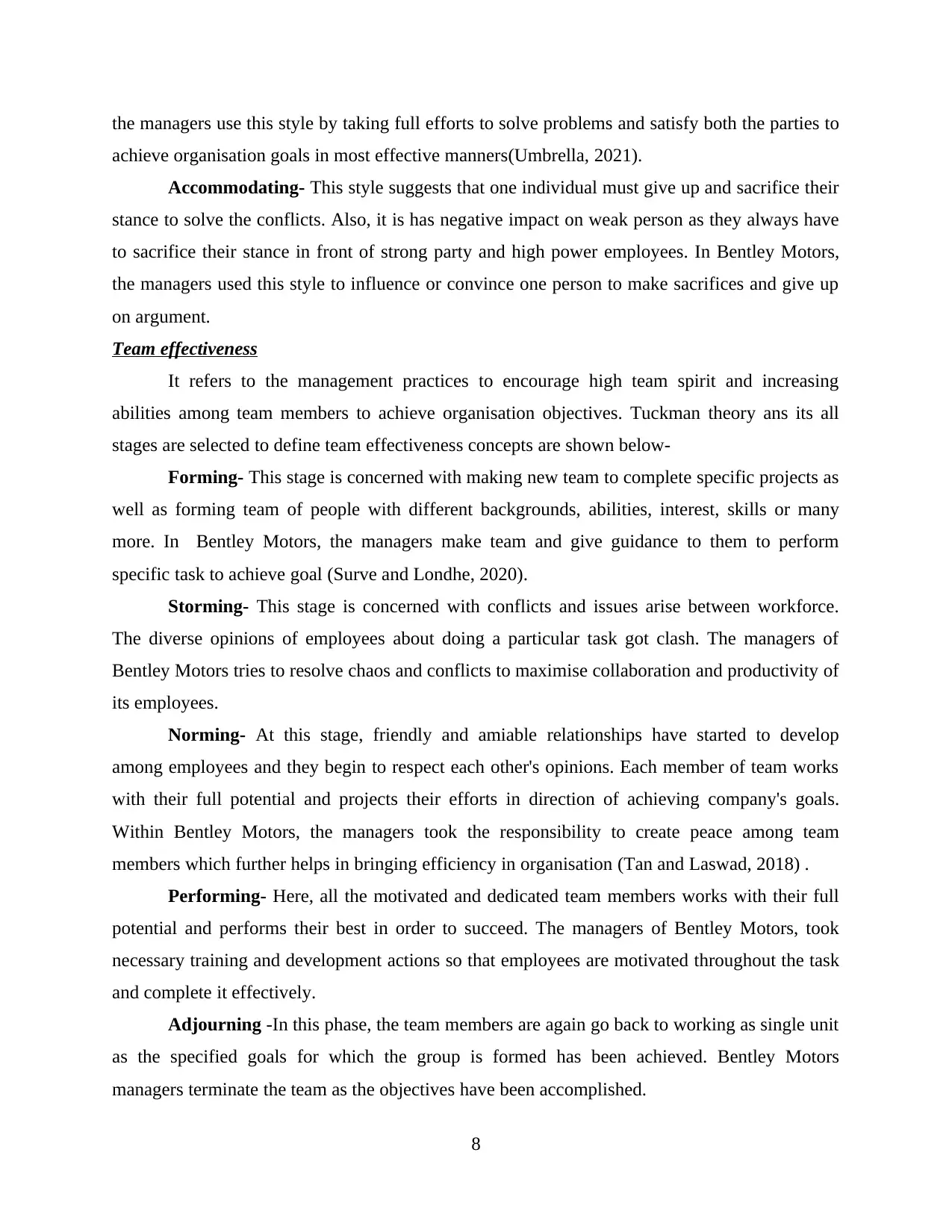
the managers use this style by taking full efforts to solve problems and satisfy both the parties to
achieve organisation goals in most effective manners(Umbrella, 2021).
Accommodating- This style suggests that one individual must give up and sacrifice their
stance to solve the conflicts. Also, it is has negative impact on weak person as they always have
to sacrifice their stance in front of strong party and high power employees. In Bentley Motors,
the managers used this style to influence or convince one person to make sacrifices and give up
on argument.
Team effectiveness
It refers to the management practices to encourage high team spirit and increasing
abilities among team members to achieve organisation objectives. Tuckman theory ans its all
stages are selected to define team effectiveness concepts are shown below-
Forming- This stage is concerned with making new team to complete specific projects as
well as forming team of people with different backgrounds, abilities, interest, skills or many
more. In Bentley Motors, the managers make team and give guidance to them to perform
specific task to achieve goal (Surve and Londhe, 2020).
Storming- This stage is concerned with conflicts and issues arise between workforce.
The diverse opinions of employees about doing a particular task got clash. The managers of
Bentley Motors tries to resolve chaos and conflicts to maximise collaboration and productivity of
its employees.
Norming- At this stage, friendly and amiable relationships have started to develop
among employees and they begin to respect each other's opinions. Each member of team works
with their full potential and projects their efforts in direction of achieving company's goals.
Within Bentley Motors, the managers took the responsibility to create peace among team
members which further helps in bringing efficiency in organisation (Tan and Laswad, 2018) .
Performing- Here, all the motivated and dedicated team members works with their full
potential and performs their best in order to succeed. The managers of Bentley Motors, took
necessary training and development actions so that employees are motivated throughout the task
and complete it effectively.
Adjourning -In this phase, the team members are again go back to working as single unit
as the specified goals for which the group is formed has been achieved. Bentley Motors
managers terminate the team as the objectives have been accomplished.
8
achieve organisation goals in most effective manners(Umbrella, 2021).
Accommodating- This style suggests that one individual must give up and sacrifice their
stance to solve the conflicts. Also, it is has negative impact on weak person as they always have
to sacrifice their stance in front of strong party and high power employees. In Bentley Motors,
the managers used this style to influence or convince one person to make sacrifices and give up
on argument.
Team effectiveness
It refers to the management practices to encourage high team spirit and increasing
abilities among team members to achieve organisation objectives. Tuckman theory ans its all
stages are selected to define team effectiveness concepts are shown below-
Forming- This stage is concerned with making new team to complete specific projects as
well as forming team of people with different backgrounds, abilities, interest, skills or many
more. In Bentley Motors, the managers make team and give guidance to them to perform
specific task to achieve goal (Surve and Londhe, 2020).
Storming- This stage is concerned with conflicts and issues arise between workforce.
The diverse opinions of employees about doing a particular task got clash. The managers of
Bentley Motors tries to resolve chaos and conflicts to maximise collaboration and productivity of
its employees.
Norming- At this stage, friendly and amiable relationships have started to develop
among employees and they begin to respect each other's opinions. Each member of team works
with their full potential and projects their efforts in direction of achieving company's goals.
Within Bentley Motors, the managers took the responsibility to create peace among team
members which further helps in bringing efficiency in organisation (Tan and Laswad, 2018) .
Performing- Here, all the motivated and dedicated team members works with their full
potential and performs their best in order to succeed. The managers of Bentley Motors, took
necessary training and development actions so that employees are motivated throughout the task
and complete it effectively.
Adjourning -In this phase, the team members are again go back to working as single unit
as the specified goals for which the group is formed has been achieved. Bentley Motors
managers terminate the team as the objectives have been accomplished.
8
Paraphrase This Document
Need a fresh take? Get an instant paraphrase of this document with our AI Paraphraser
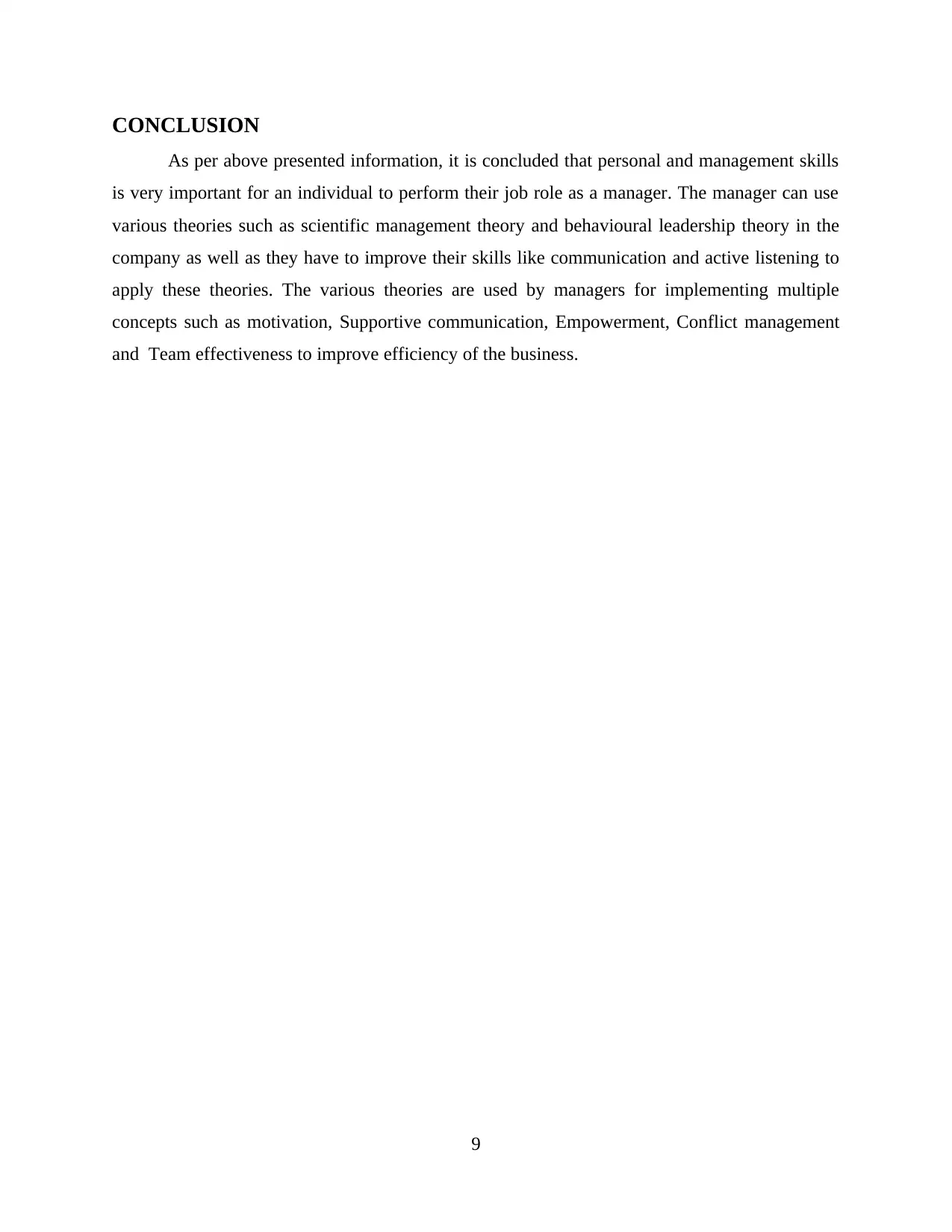
CONCLUSION
As per above presented information, it is concluded that personal and management skills
is very important for an individual to perform their job role as a manager. The manager can use
various theories such as scientific management theory and behavioural leadership theory in the
company as well as they have to improve their skills like communication and active listening to
apply these theories. The various theories are used by managers for implementing multiple
concepts such as motivation, Supportive communication, Empowerment, Conflict management
and Team effectiveness to improve efficiency of the business.
9
As per above presented information, it is concluded that personal and management skills
is very important for an individual to perform their job role as a manager. The manager can use
various theories such as scientific management theory and behavioural leadership theory in the
company as well as they have to improve their skills like communication and active listening to
apply these theories. The various theories are used by managers for implementing multiple
concepts such as motivation, Supportive communication, Empowerment, Conflict management
and Team effectiveness to improve efficiency of the business.
9
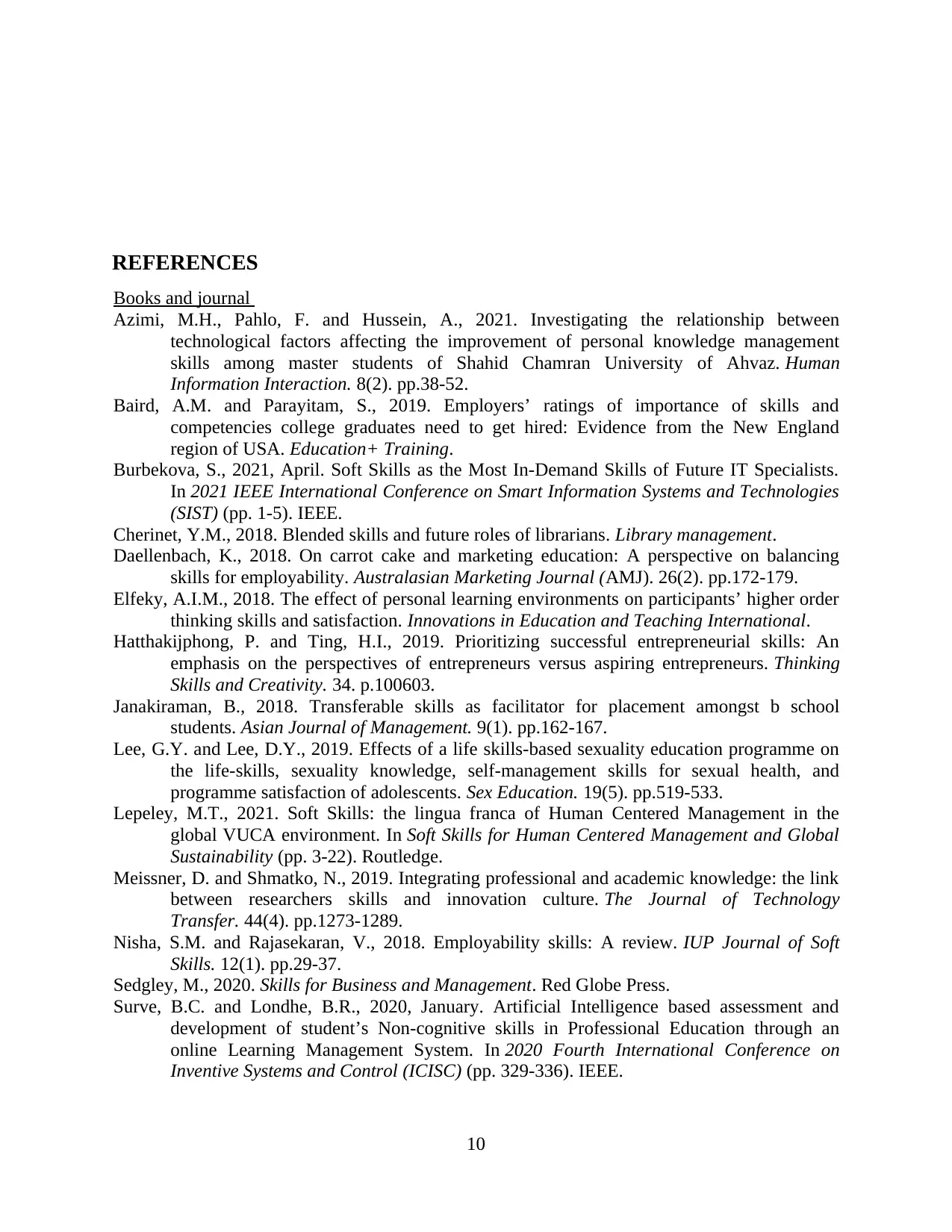
REFERENCES
Books and journal
Azimi, M.H., Pahlo, F. and Hussein, A., 2021. Investigating the relationship between
technological factors affecting the improvement of personal knowledge management
skills among master students of Shahid Chamran University of Ahvaz. Human
Information Interaction. 8(2). pp.38-52.
Baird, A.M. and Parayitam, S., 2019. Employers’ ratings of importance of skills and
competencies college graduates need to get hired: Evidence from the New England
region of USA. Education+ Training.
Burbekova, S., 2021, April. Soft Skills as the Most In-Demand Skills of Future IT Specialists.
In 2021 IEEE International Conference on Smart Information Systems and Technologies
(SIST) (pp. 1-5). IEEE.
Cherinet, Y.M., 2018. Blended skills and future roles of librarians. Library management.
Daellenbach, K., 2018. On carrot cake and marketing education: A perspective on balancing
skills for employability. Australasian Marketing Journal (AMJ). 26(2). pp.172-179.
Elfeky, A.I.M., 2018. The effect of personal learning environments on participants’ higher order
thinking skills and satisfaction. Innovations in Education and Teaching International.
Hatthakijphong, P. and Ting, H.I., 2019. Prioritizing successful entrepreneurial skills: An
emphasis on the perspectives of entrepreneurs versus aspiring entrepreneurs. Thinking
Skills and Creativity. 34. p.100603.
Janakiraman, B., 2018. Transferable skills as facilitator for placement amongst b school
students. Asian Journal of Management. 9(1). pp.162-167.
Lee, G.Y. and Lee, D.Y., 2019. Effects of a life skills-based sexuality education programme on
the life-skills, sexuality knowledge, self-management skills for sexual health, and
programme satisfaction of adolescents. Sex Education. 19(5). pp.519-533.
Lepeley, M.T., 2021. Soft Skills: the lingua franca of Human Centered Management in the
global VUCA environment. In Soft Skills for Human Centered Management and Global
Sustainability (pp. 3-22). Routledge.
Meissner, D. and Shmatko, N., 2019. Integrating professional and academic knowledge: the link
between researchers skills and innovation culture. The Journal of Technology
Transfer. 44(4). pp.1273-1289.
Nisha, S.M. and Rajasekaran, V., 2018. Employability skills: A review. IUP Journal of Soft
Skills. 12(1). pp.29-37.
Sedgley, M., 2020. Skills for Business and Management. Red Globe Press.
Surve, B.C. and Londhe, B.R., 2020, January. Artificial Intelligence based assessment and
development of student’s Non-cognitive skills in Professional Education through an
online Learning Management System. In 2020 Fourth International Conference on
Inventive Systems and Control (ICISC) (pp. 329-336). IEEE.
10
Books and journal
Azimi, M.H., Pahlo, F. and Hussein, A., 2021. Investigating the relationship between
technological factors affecting the improvement of personal knowledge management
skills among master students of Shahid Chamran University of Ahvaz. Human
Information Interaction. 8(2). pp.38-52.
Baird, A.M. and Parayitam, S., 2019. Employers’ ratings of importance of skills and
competencies college graduates need to get hired: Evidence from the New England
region of USA. Education+ Training.
Burbekova, S., 2021, April. Soft Skills as the Most In-Demand Skills of Future IT Specialists.
In 2021 IEEE International Conference on Smart Information Systems and Technologies
(SIST) (pp. 1-5). IEEE.
Cherinet, Y.M., 2018. Blended skills and future roles of librarians. Library management.
Daellenbach, K., 2018. On carrot cake and marketing education: A perspective on balancing
skills for employability. Australasian Marketing Journal (AMJ). 26(2). pp.172-179.
Elfeky, A.I.M., 2018. The effect of personal learning environments on participants’ higher order
thinking skills and satisfaction. Innovations in Education and Teaching International.
Hatthakijphong, P. and Ting, H.I., 2019. Prioritizing successful entrepreneurial skills: An
emphasis on the perspectives of entrepreneurs versus aspiring entrepreneurs. Thinking
Skills and Creativity. 34. p.100603.
Janakiraman, B., 2018. Transferable skills as facilitator for placement amongst b school
students. Asian Journal of Management. 9(1). pp.162-167.
Lee, G.Y. and Lee, D.Y., 2019. Effects of a life skills-based sexuality education programme on
the life-skills, sexuality knowledge, self-management skills for sexual health, and
programme satisfaction of adolescents. Sex Education. 19(5). pp.519-533.
Lepeley, M.T., 2021. Soft Skills: the lingua franca of Human Centered Management in the
global VUCA environment. In Soft Skills for Human Centered Management and Global
Sustainability (pp. 3-22). Routledge.
Meissner, D. and Shmatko, N., 2019. Integrating professional and academic knowledge: the link
between researchers skills and innovation culture. The Journal of Technology
Transfer. 44(4). pp.1273-1289.
Nisha, S.M. and Rajasekaran, V., 2018. Employability skills: A review. IUP Journal of Soft
Skills. 12(1). pp.29-37.
Sedgley, M., 2020. Skills for Business and Management. Red Globe Press.
Surve, B.C. and Londhe, B.R., 2020, January. Artificial Intelligence based assessment and
development of student’s Non-cognitive skills in Professional Education through an
online Learning Management System. In 2020 Fourth International Conference on
Inventive Systems and Control (ICISC) (pp. 329-336). IEEE.
10
⊘ This is a preview!⊘
Do you want full access?
Subscribe today to unlock all pages.

Trusted by 1+ million students worldwide
1 out of 13
Related Documents
Your All-in-One AI-Powered Toolkit for Academic Success.
+13062052269
info@desklib.com
Available 24*7 on WhatsApp / Email
![[object Object]](/_next/static/media/star-bottom.7253800d.svg)
Unlock your academic potential
Copyright © 2020–2026 A2Z Services. All Rights Reserved. Developed and managed by ZUCOL.




